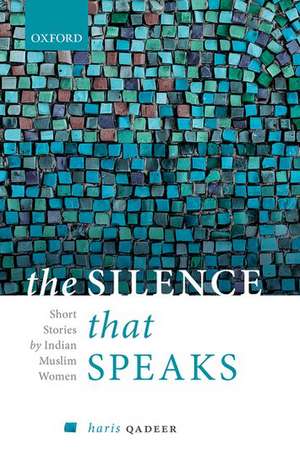The Silence That Speaks: Short Stories by Indian Muslim Women
Editat de Haris Qadeeren Limba Engleză Hardback – 19 oct 2022
Preț: 340.41 lei
Preț vechi: 468.22 lei
-27% Nou
Puncte Express: 511
Preț estimativ în valută:
65.14€ • 68.10$ • 55.05£
65.14€ • 68.10$ • 55.05£
Carte disponibilă
Livrare economică 03-10 februarie
Preluare comenzi: 021 569.72.76
Specificații
ISBN-13: 9780190132613
ISBN-10: 0190132612
Pagini: 500
Dimensiuni: 150 x 222 x 25 mm
Greutate: 0.49 kg
Editura: OUP INDIA
Colecția OUP India
Locul publicării:Delhi, India
ISBN-10: 0190132612
Pagini: 500
Dimensiuni: 150 x 222 x 25 mm
Greutate: 0.49 kg
Editura: OUP INDIA
Colecția OUP India
Locul publicării:Delhi, India
Recenzii
A spectacular collection that opens up to the English reading public a remarkable range of short stories written by Muslim women in the subcontinent. As Haris Qadeer's expert introduction argues, these writings challenge perennial tendencies to generalize either about Muslim women's silences or voices.' - Lila Abu-Lughod, Joseph L. Buttenweiser Professor of Anthropology and Gender Studies, Columbia University, New York.
'Qadeer has assembled here a myriad of Indian Muslim women's voices, some well-known, others deserving of greater renown. All of them challenge hoary stereotypes left over from harem imagery and colonial generalizations. Translated from multiple languages, the selected stories exemplify the tremendous variety of regional cultures contained in the category, Indian Muslims.' - Gail Minault, Professor Emerita of History, University of Texas.
'Brought together for the first time, the stories in Haris Qadeer's wonderful collection incorporate at least half of India's official languages, from Bengali and Hindi to Telugu and Assamese. Taken together, these sparkling stories give the lie to widespread attempts to shunt Muslim women into the pigeonhole of victimhood.' - Claire Chambers, Professor of Global Literature, University of York.
'Qadeer has assembled here a myriad of Indian Muslim women's voices, some well-known, others deserving of greater renown. All of them challenge hoary stereotypes left over from harem imagery and colonial generalizations. Translated from multiple languages, the selected stories exemplify the tremendous variety of regional cultures contained in the category, Indian Muslims.' - Gail Minault, Professor Emerita of History, University of Texas.
'Brought together for the first time, the stories in Haris Qadeer's wonderful collection incorporate at least half of India's official languages, from Bengali and Hindi to Telugu and Assamese. Taken together, these sparkling stories give the lie to widespread attempts to shunt Muslim women into the pigeonhole of victimhood.' - Claire Chambers, Professor of Global Literature, University of York.
Notă biografică
Haris Qadeer teaches at the Department of English, University of Delhi, India. He was a UGC-DAAD visiting fellow to the Department of English, Potsdam University, Germany (2019), and the Charles Wallace Visiting fellowship to the King’s College, London, UK (2022). He has co-edited the special issue of Thesis Eleven on Postcolonial World Literature and Sultana’s Sisters: Genre, Genre, and Genealogy in South Asian Muslim Women’s Fiction (2021). His forthcoming projects include Medical Maladies: Stories on Disease and Cure from Indian Languages (2022) and an English translation of a Hindi play.
